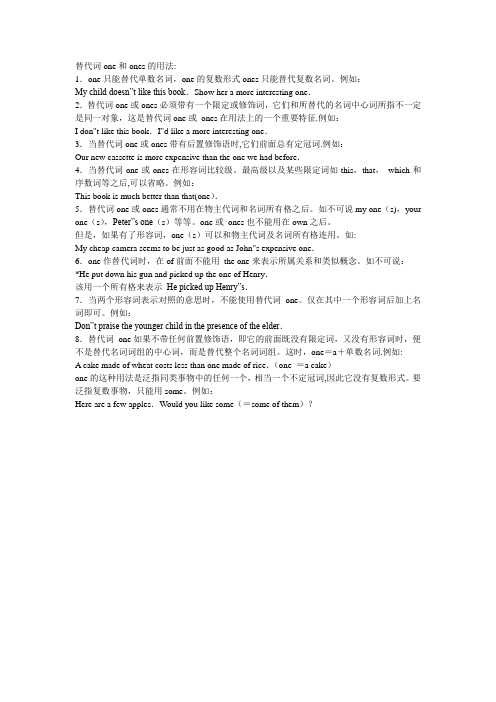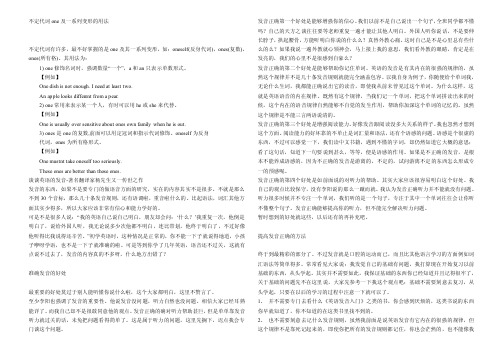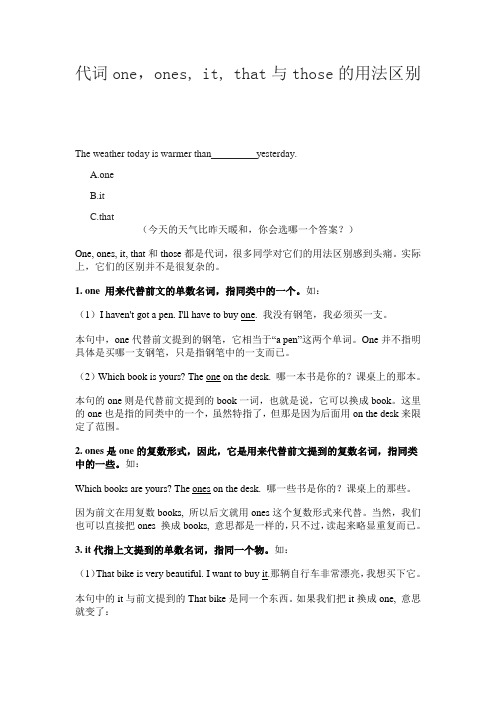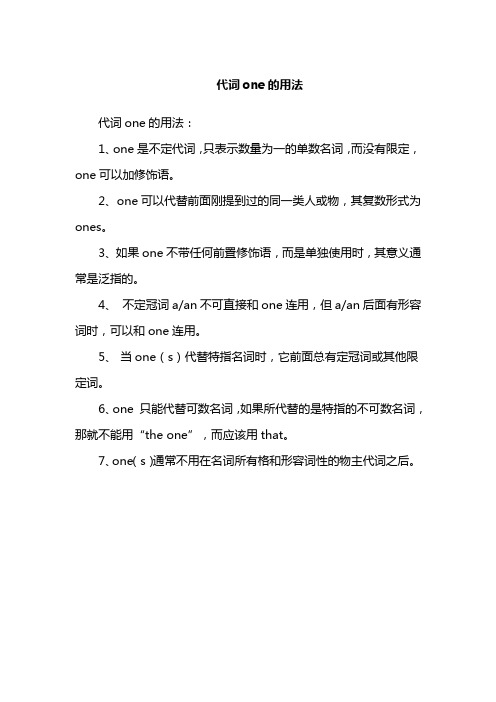代词one的用法
- 格式:doc
- 大小:21.50 KB
- 文档页数:6

one ones the one the ones的用法"one," "ones," "the one," 和"the ones" 在英语中都用来指代单数或复数的物品,但它们的用法有所不同:1. "One": 这是一个不定代词,用来指代单数的任意一个物品。
例如:- I have a book. One is on the table. (我有一本书。
一本在桌子上。
)2. "Ones": 这是"one" 的复数形式,用来指代复数的任意一些物品。
例如:- I have some books. The red ones are mine. (我有一些书。
红色的是我的。
)3. "The one": 这是一个定指的代词,用来特指单数的某个特定物品。
例如:- Among all the books, the one with the blue cover is my favorite. (在所有的书中,那本蓝色封面的是我最喜欢的。
)4. "The ones": 这是"the one" 的复数形式,用来特指复数的某些特定物品。
例如:- I like those paintings. The ones with landscapes are my favorites. (我喜欢那些画。
那些有风景的是我的最爱。
)总的来说,"one" 和"ones" 是泛指,而"the one" 和"the ones" 是特指。
在使用时需要注意上下文,以确保指代清晰明确。

替代词one和ones的用法:1.one只能替代单数名词,one的复数形式ones只能替代复数名词。
例如:My child doesn”t like this book.Show her a more interesting one.2.替代词one或ones必须带有一个限定或修饰词,它们和所替代的名词中心词所指不一定是同一对象,这是替代词one或ones在用法上的一个重要特征.例如:I don"t like this book.I"d like a more interesting one.3.当替代词one或ones带有后置修饰语时,它们前面总有定冠词.例如:Our new cassette is more expensive than the one we had before.4.当替代词one或ones在形容词比较级、最高级以及某些限定词如this,that,which和序数词等之后,可以省略。
例如:This book is much better than that(one).5.替代词one或ones通常不用在物主代词和名词所有格之后。
如不可说my one(s),your one(s),Peter”s one(s)等等。
one或ones也不能用在own之后。
但是,如果有了形容词,one(s)可以和物主代词及名词所有格连用。
如:My cheap camera seems to be just as good as John"s expensive one.6.one作替代词时,在of前面不能用the one来表示所属关系和类似概念。
如不可说:*He put down his gun and picked up the one of Henry.该用一个所有格来表示He picked up Henry”s.7.当两个形容词表示对照的意思时,不能使用替代词one。


one和ones的用法一、什么是“one”和“ones”的用法介绍在英语中,当我们需要指代某个事物或者人的时候,常常会用到代词。
而其中,“one”和“ones”是非常常见且易混淆的两个词汇。
本文将对这两个词的用法进行详细的介绍和示范,旨在帮助读者更好地理解并运用它们。
二、“one” 和“ones”的基本概念1. “One”的基本意思“One” 是一个不定代词,它可以用来指代特定的事物或人。
当我们不想重复前面提到的名词时,可以使用它来替代,并避免冗余重复。
2. “Ones”的基本意思“Ones” 是“one”的复数形式,表示多个特定的事物或人。
通常在选择或比较中使用,“ones”相对于名词前面所修饰的数量和单数与复数等吻合。
三、“one" 和 "ones" 的具体应用场景解析1. 用于泛指同类事物或人当我们需要泛指一类相似或同类事物或人时,可以使用“One”。
例如:- I love dogs, but I don't have one.我喜欢狗,但我没有养只狗。
- Can I have a pen? I've lost mine.我能借一支笔吗?我的丢了。
2. 用于特指某个事物或人当我们需要特定地指代一个特定的事物或人时,可以使用“One”。
例如:- The blue shirt is nice, but I prefer the red one.蓝色的衬衫很漂亮,但我更喜欢红色的。
- Which book do you want to read, the romance one or the mystery one?你想读哪本书,爱情类的还是悬疑类的?3. 复数形式 "ones" 的使用当我们需要表示复数的特定事物或人时,可以使用“ones”来替代。
例如:- These shoes are too tight, I'll try the larger ones.这些鞋太紧了,我试试大一点儿的。

代词one的用法一、基本用法归纳1. 用于泛指人们或任何人,包括说话人和听话人,其用法与表泛指的you相似。
如:One must believe in something. 人一定要有信仰。
One shouldn’t be too hard on oneself. 一个人不能对自己太苛刻。
One always thinks other people’s lives are more interes ng. 人们总是认为别人的生活更加有趣。
在美国英语里,如果one用在句首,后面提到这个one时常常用he, him 和his,但在英国英语里则仍用one。
如:One cannot succeed at this unless he [one] tries hard. 除非你很努力,否则这事就成功不了。
2. 用于表示某个不确定的人或事物,其意相当于“不定冠词+名词”。
如:I’d like one with a garden. 我想要一座带花园的。
(其中的one相当于a house等)He talks to one like a teacher. 他和人谈话就像个老师似的。
(其中的one相当于a person, a man等)3. 表示两个或多个中的“一个”。
如:One of my weaknesses is smoking too much. 我的缺点之一是抽烟太多。
Here are two books. One is for Mary, the other is for Jack. 这里有两本书,一本给玛丽,一本给杰克。
One person may like to spend his vaca on at the seashore, while another may prefer the mountains. 一个人会喜欢在海滨度假,而另一个人会喜欢在山里度假。
On its face, it has three hands. One is short, the other two are long. 其上有三根针,一根短,另两根长。

不定代词one及一系列变形的用法不定代词有许多,最不好掌握的是one及其一系列变形,如:oneself(反身代词),ones(复数),ones(所有格)。
其用法为:1) one修饰名词时,强调数量“一个”,a和an只表示单数形式。
【例如】One dish is not enough. I need at least two.An apple looks differe nt from a pear.2) one常用来表示某一个人,有时可以用he或she来代替。
【例如】One is usually over sensiti ve about ones own familywhen he is out.3) ones是on e的复数,前面可以用定冠词和指示代词修饰。
oneself为反身代词,ones为所有格形式。
【例如】One mustnttake oneself too serious ly.These ones are betterthan those ones.谈谈英语的发音-著名翻译家杨先生又一传世之作发音的东西,如果不是要专门的做语音方面的研究,实在的内容其实不是很多。
不就是那么不到30个音标,那么几十条发音规则,还有语调啦,重音啦什么的。
比起语法,词汇其他方面其实少得多,所以大家应该非常有信心和能力学好的。
可是不是很多人说:“我的英语自己说自己明白,朋友却会问:…什么?‟我重复一次,他倒是明白了,说给外国人听,我无论说多少次他都不明白,连比带划,他终于明白了,不过好像他听得比我说得还辛苦。
”初学英语时,这种情况是正常的,你不能一下子就说得地道,小孩子咿呀学语,也不是一下子就准确的啦。
可是等到你学了几年英语,语音还不过关,这就有点说不过去了,发音的内容真的不多呀,什么地方出错了?准确发音的好处最重要的好处莫过于别人能听懂你说什么啦,这个大家都明白,这里不赘言了。

代词 those , the ones, one, ones 等的用法
以下是关于这些代词的用法说明:
1. Those:those 是复数形式的代词,用来指代离说话者和听话者都较远的人或物。
例如:
- Have you seen those shoes? They are so stylish.
2. The ones:the ones 是 those 的强调形式,用来特指前面提到过的事物。
它可以用来代替特定的名词。
例如:
- I like the red dress, but the blue one is too expensive.
3. One:one 是不定代词,用来指代一个不特定的人或物。
它可以用来代替单个的名词、一个人或一组人中的任何一个。
例如:
- I need a white shirt. Do you have one?
- In our group, everyone has his or her own role. John is the one who manages the finances.
4. Ones:ones 通常用来指代前面提到过的多个事物,是指那些事物的复数形式。
例如:
- Which jacket do you prefer, the red one or the blue one? - I like the blue ones better.
需要注意的是,这些代词的使用要根据上下文来确定,以确保对人或物的指代准确无误。

代词it和one的用法代词"it"和"one"是英语中非常常见的代词,在不同的语境中有着不同的用法。
本文将探讨这两个代词的用法,包括指示代词、不定代词、虚主语等方面。
一、指示代词的用法1. "It"作为指示代词时,用来引用或强调先前提及过的特定事物或事实。
例如:- The cat is on the table. It is sleeping.(猫在桌子上。
它正在睡觉。
)- I lost my phone, but luckily I found it later.(我丢了手机,但幸运的是后来我找到它了。
)2. "One"作为指示代词时,可以在一系列相似事物中选择一个来引用。
例如:- I have two dogs. One is brown and the other is black.(我有两只狗,一只是棕色的,另一只是黑色的。
)二、不定代词的用法1. "It"作为不定代词时,表示某种未知或泛指的事物或情况。
- Where's my spoon? I can't find it.(我的勺子在哪里?我找不到它。
)- It is raining outside. Take an umbrella with you.(外面正在下雨。
带把伞吧。
)2. "One"作为不定代词时,用来指代泛指的事物或人。
- If you want to learn a new skill, one should be patient and persistent.(如果你想学一项新技能,一个人应该耐心和坚持。
)- It's important to find a job that one enjoys.(找到一份自己喜欢的工作非常重要。
)三、虚主语的用法1. "It"作为虚主语,常见于表示天气、时间、距离等方面的句子中。

代词one,ones, it, that与those的用法区别The weather today is warmer than yesterday.A.oneB.itC.that(今天的天气比昨天暖和,你会选哪一个答案?)One, ones, it, that和those都是代词,很多同学对它们的用法区别感到头痛。
实际上,它们的区别并不是很复杂的。
1. one 用来代替前文的单数名词,指同类中的一个。
如:(1)I haven't got a pen. I'll have to buy one. 我没有钢笔,我必须买一支。
本句中,one代替前文提到的钢笔,它相当于“a pen”这两个单词。
One并不指明具体是买哪一支钢笔,只是指钢笔中的一支而已。
(2)Which book is yours? The one on the desk. 哪一本书是你的?课桌上的那本。
本句的one则是代替前文提到的book一词,也就是说,它可以换成book。
这里的one也是指的同类中的一个,虽然特指了,但那是因为后面用on the desk来限定了范围。
2. ones是one的复数形式,因此,它是用来代替前文提到的复数名词,指同类中的一些。
如:Which books are yours? The ones on the desk. 哪一些书是你的?课桌上的那些。
因为前文在用复数books, 所以后文就用ones这个复数形式来代替。
当然,我们也可以直接把ones 换成books, 意思都是一样的,只不过,读起来略显重复而已。
3. it代指上文提到的单数名词,指同一个物。
如:(1)That bike is very beautiful. I want to buy it.那辆自行车非常漂亮,我想买下它。
本句中的it与前文提到的That bike是同一个东西。
如果我们把it换成one, 意思就变了:。

一、one作代词的用法1.one替代由可数名词所表示的一类人或事物中的任何一个,即泛指中的强调.这时,替代词one前面不可加任何限定词.例如:1)I hope there are enough glasses for each guest to have one.(NMET'95)2)A color TV set made in Japan costs more than one made in China.3)-Who can lend me a Chinese-English dictionary?-I have one.2.one用来替代特指的同一类人或事物的可数名词时,其前面必须加上限定词(如a,the, this, that等)、物主代词或形容词加以修饰.例如:1)If you don't like this blue coat, you can buy a black one.2)I don't want the book on the shelf, I want this one on the desk.3)Your old bike is white, while my old one is black.3.one在定语从句中作先行词替代特指的同一类人或事物时,其前面必须用定冠词the限定,但不可用that替换.如果先行词为"one of...",其关系代词在定语从句中作主语,从句中的谓语动词常用复数形式.例如:1)This farm is the one that we visited last summer.(句中the one代替thisfarm,作先行词,不可用that替代)2)This is one of the highest buildings that have been built in our city recently.3)Zhang Lei is the very one of the students who has been praised at themeeting.4.one的复数形式为ones,作替代词时,只可替代同一类人或事物的复数名词,其前面必须有限定词,如the, some, all等修饰.但不能用数词或many修饰.例如:1)Mr. Zhang gave the textbooks to the pupils except the ones who hadalready taken them.(句中the ones可用those替代)(MET92)2)I don't want to buy these small pears; I want some large ones.3)She wants to buy some new clothes and throw away all her old ones.5.one在句中不可替代不可数名词.在句中如果出现了同一个不可数名词时,则需要重复前一个名词,或者省略那个名词.例如:1)I prefer black coffee to white (coffee) .(white coffee中的coffee可省略也可不省,但不可用one替代coffee)2)Folk music is the music that I like most.(不可用the one替代the music)二、it作替代词的用法1.it用来替代前面提到的同一事物时,被替代的名词可以是可数名词,也可以是不可数名词.例如:1)We are studying in a school with trees all around it.(it替代可数名词school)2)-Have you still kept your old furniture?-No,I have sold it.(it替代不可数名词furniture)2.it可以替代英语句式中的不定式(短语)、动名词(短语)或从句,在句中作形式主语或形式宾语.例如:1)It is a great surprise to meet you here.(It替代不定式短语to meet you here)2)I think it is no good parents doing anything for their children.(it替代动名词的复合结构parents doing anything for短语)3)We found it impossible that they could complete the task in two hours.(it 替代that they could...从句)3.it可以替代前面的某一名词或整个句子的内容.这时,可用that替换,也可以改为非限制性定语从句.有时it可以前置替代,用以代替后面整个句子的内容.这时,不可用that替换.例如:1)He said he had never met her,and it is not true.(it替代前面整个句子He said...)2)I hate it when people talk with their mouths full.(it代替后面整个句子when people talk with...)(NMET'98)三、that作替代词的用法1.that用来替代前面提到的特指的事物,所代替的名词可以是可数名词,也可以是不可数名词.代替可数名词可以用the one替换.但其前面不可用任何限定词修饰.例如:1)The population of China is larger than that of Japan.(that代替不可数名词population,不可用the one替换)2)The headteacher in your class is younger and more active than that in theirs.(that代替可数名词headteacher,可用the one替换)2.that在并列分句中,可以替代前面某一个名词或整个句子内容,这时,可用it替换,也可改为非限制性定语从句.例如:1)She heard a terrible noise,and that brought her heart into her mouth.(that 替代前面的名词noise)2)They said they had discussed the problem,and that (=it) was impossible.(that替代前面整个并列分句They said...)3.that在定语从句中,可作关系代词,代替某个先行词(人或物).例如:1)The lady that came to our class is from Australia.(that指代先行词lady)2)A clock is a machine that tells people the time.(that指代先行词machine)4.that的复数形式为those,只可替代可数名词复数,在句中相当于the ones.例如:1)The nights there in summer are shorter than those in winter.(those替代nights,可用the ones替换)2)The students who do best in the exam are not always those with the best brains.(those替代students,可用the ones替换)。

代词one的用法
代词one的用法:
1、one是不定代词,只表示数量为一的单数名词,而没有限定,one可以加修饰语。
2、one可以代替前面刚提到过的同一类人或物,其复数形式为ones。
3、如果one不带任何前置修饰语,而是单独使用时,其意义通常是泛指的。
4、不定冠词a/an不可直接和one连用,但a/an后面有形容词时,可以和one连用。
5、当one(s)代替特指名词时,它前面总有定冠词或其他限定词。
6、one 只能代替可数名词,如果所代替的是特指的不可数名词,那就不能用“the one”,而应该用that。
7、one(s)通常不用在名词所有格和形容词性的物主代词之后。

代词o ne用法详解1.在正式文体中,o ne可用来泛指“人们”“任何人”(通常没有修饰语)。
如:One c an n ever b e t oo c areful.越仔细越好。
One d oes n ot l ike t o h ave h is w ord d oubted.谁都不愿意别人怀疑自己的话。
One c an t ravel t o H olland b y b oat o r b y a ir.到荷兰去,可以坐船,也可以乘飞机。
相应的所有格和反身代词可用o ne’s和o neself,但在美国英语中常用h is和h imself代之。
如:One m ust l ove o ne’s[h is]c ountry.谁都必须爱国。
One’s t hinking d irects o ne’s a ctions.思想指导行为。
One s houldn’t b e t oo h ard o n o neself[h imself].一个人不应该太难为自己。
用o ne泛指“人们”是一种比较正式的用法,在口语或非正式文体中通常用y ou,p eople等。
如:You c an’t b e t oo c areful,c an y ou?小心为妙,可不是吗?You s hould n ot b e f orgetful o f y our r esponsibilities.人们不应该忽视自己的职责。
2.用作替代词,可用于代替可数名词,但不能替代不可数名词,用法如下:(1)使用时要注意分清是泛指还是特指:①表泛指或非特指,直接用o ne,其前不用不定冠词。
如:A f ast t rain i s o ne t hat g oes f ast.快车是一种行驶快的火车。
This d ictionary h as s everal a ppendices,i ncluding o ne o n i rregular v erbs.这部词典有几项附录,包括不规则动词附录。

代词one的用法一、基本用法归纳1、用于泛指人们或任何人,包括说话人与听话人,其用法与表泛指的you相似。
如:One must believe in something、人一定要有信仰。
One shouldn’t be too hard on oneself、一个人不能对自己太苛刻。
One always thinks other people’s lives are more interesting、人们总就是认为别人的生活更加有趣。
在美国英语里,如果one用在句首,后面提到这个one时常常用he, him 与his,但在英国英语里则仍用one。
如:One cannot succeed at this unless he [one] tries hard、除非您很努力,否则这事就成功不了。
2、用于表示某个不确定的人或事物,其意相当于“不定冠词+名词”。
如:I’d like one with a garden、我想要一座带花园的。
(其中的one相当于a house 等)He talks to one like a teacher、她与人谈话就像个老师似的。
(其中的one相当于a person, a man等)3、表示两个或多个中的“一个”。
如:One of my weaknesses is smoking too much、我的缺点之一就是抽烟太多。
Here are two books、One is for Mary, the other is for Jack、这里有两本书,一本给玛丽,一本给杰克。
One person may like to spend his vacation at the seashore, while another may prefer the mountains、一个人会喜欢在海滨度假,而另一个人会喜欢在山里度假。
On its face, it has three hands、One is short, the other two are long、其上有三根针,一根短,另两根长。

代词it和one和that用法区别在英语中,代词扮演着非常重要的角色,用于替代名词并在句子中起到指代作用。
本文将讨论三个常见代词:it、one和that的用法区别。
1. 代词it的用法代词it常用于替代对应的名词,尤其是以下情况:- 指代无性别的事物或概念,例如:- I have a book. It is on the table.(我有一本书。
它在桌子上。
)- The weather is nice today. It is sunny and warm.(今天天气很好。
天晴而温暖。
)- 指代前面提到过的特定事物或概念,以避免重复,例如:- I want to buy a new car. It will be red.(我想买一辆新车。
它会是红色的。
)- She is going to the cinema. It is her favorite place.(她要去电影院。
那是她最喜欢的地方。
)- 在天气描述中,用来指代自然现象或气候状况,例如:- It is raining heavily outside.(外面雨下得很大。
)- It was snowing all day yesterday.(昨天整天都在下雪。
)2. 代词one的用法代词one通常用于指代不特定的人或事物,具有泛指的含义,例如:- Would you like a cookie? Yes, I'd like one.(你想要一个饼干吗?是的,我想要一个。
)- Which dress do you prefer, the blue one or the red one?(你喜欢哪条裙子,蓝色的还是红色的?)- I don't have a pen. Can I borrow one from you?(我没有笔。
我能向你借一个吗?)另外,one也可以用作代词与数词连用,表示不特定的数量,例如:- There were two apples on the table, but now there is only one.(桌子上原本有两个苹果,但现在只剩下一个了。

one和that的用法一、"one"和"that"的基本用法在英文中,使用代词是非常常见的。
其中,"one" 和"that" 是两个常用的代词。
它们可以在句子中作主语、宾语或定语等。
正确使用这些代词能够让我们的表达更加准确和流利。
下面将详细介绍 "one" 和 "that" 的用法。
二、"one" 的用法1. 作为指示代词: "one"首先,我们来讨论 "one" 作为指示代词的用法。
在这种情况下,它可以替代前面提到过的人或物,并且帮助避免重复使用名词。
例句1: I have two pens, but I only need one.(我有两支钢笔,但我只需要一支)例句2: She wants an orange; could you give her one?(她想要一个橙子,你能给她一个吗?)2. 作为数词: "one"此外,“one” 还可作为数词使用,表示一个或者某些特定数量的人或物。
例句3: There is only one apple left in the basket.(篮子里还剩下一个苹果)例句4: Can I have three pieces of cake? No, just one.(我能吃三块蛋糕吗?不行,只能吃一块)3. 作为代名词: "someone" 的同义词当我们想要指代某个未具体指明的人时,我们可以使用 "one" 来表示。
例句5: In this neighborhood, one must be cautious at night.(在这个社区,晚上必须小心谨慎)例句6: One should always try their best to achieve their goals.(一个人应该始终尽力实现自己的目标)三、"that" 的用法1. 作为指示代词: "that"跟 "one" 类似, "that" 可以用作指示代词。

一、one作代词的用法1.one替代由可数名词所表示的一类人或事物中的任何一个,即泛指中的强调。
这时,替代词one前面不可加任何限定词.例如:1)I hope there are enough glasses for each guest to have one.(NMET’95)2)A color TV set made in Japan costs more than one made in China。
3)-Who can lend me a Chinese—English dictionary?—I have one.2。
one用来替代特指的同一类人或事物的可数名词时,其前面必须加上限定词(如a,the, this,that等)、物主代词或形容词加以修饰。
例如:1)If you don't like this blue coat,you can buy a black one.2)I don't want the book on the shelf,I want this one on the desk.3)Your old bike is white,while my old one is black。
3.one在定语从句中作先行词替代特指的同一类人或事物时,其前面必须用定冠词the限定,但不可用that替换.如果先行词为”one of。
.”,其关系代词在定语从句中作主语,从句中的谓语动词常用复数形式。
例如:1)This farm is the one that we visited last summer。
(句中the one代替this farm,作先行词,不可用that替代)2)This is one of the highest buildings that have been built in our city recently.3)Zhang Lei is the very one of the students who has been praised at the meeting.4。
代词one的用法一、基本用法归纳1. 用于泛指人们或任何人,包括说话人和听话人,其用法与表泛指的you相似。
如:One must believe in something. 人一定要有信仰。
One shouldn’t be too hard on oneself. 一个人不能对自己太苛刻。
One always thinks other people’s lives are more interesting. 人们总是认为别人的生活更加有趣。
在美国英语里,如果one用在句首,后面提到这个one时常常用he, him 和his,但在英国英语里则仍用one。
如:One cannot succeed at this unless he [one] tries hard. 除非你很努力,否则这事就成功不了。
2. 用于表示某个不确定的人或事物,其意相当于“不定冠词+名词”。
如:I’d like one with a garden. 我想要一座带花园的。
(其中的one相当于a house等)He talks to one like a teacher. 他和人谈话就像个老师似的。
(其中的one相当于a person, a man等)3. 表示两个或多个中的“一个”。
如:One of my weaknesses is smoking too much. 我的缺点之一是抽烟太多。
Here are two books. One is for Mary, the other is for Jack. 这里有两本书,一本给玛丽,一本给杰克。
One person may like to spend his vacation at the seashore, while another may prefer the mountains. 一个人会喜欢在海滨度假,而另一个人会喜欢在山里度假。
On its face, it has three hands. One is short, the other two are long. 其上有三根针,一根短,另两根长。
4. 用于习语one after the other或one after another,其意为“一个接一个地”“依次地”“陆续地”。
如:Planes took off one after another. 飞机陆续起飞。
The boy showed me his dirty hands one after the other. 那男孩把他脏兮兮的手依序伸给我看。
5. 用于习语on the one hand...on the other (hand)...,其意为“一方面……另一方面……”。
如:On the one hand he suffered a heavy loss, but on the other hand he learned a great deal from the experience. 一方面,他蒙受了极大的损失;另一方面,他则由此教训学到很多经验。
二、有关的语法说明1. one只能代替可数名词,其意相当于“a / an +可数名词”。
如:I’m looking for a jacket. I’d like one with a bag. 我正在找一件夹克,我想要件带兜的。
one有复数形式ones。
如:Green apples often taste better than red ones. 绿苹果往往比红苹果好吃。
注意,用one(s)来代替不可数名词是错误的。
如:不要用奶粉,要用这鲜奶。
误:Don’t use powdered milk. Use this fresh one.正:Don’t use powdered milk. Use this fresh (milk).如果你没有鲜奶油,我就要罐头的吧。
误:If you haven’t got fresh cream, I’ll take tinned one.正:If you haven’t got fresh cream, I’ll take tinned (cream).另外,用one代替抽象名词也很少见。
如下面一句中的the English system最好不要换成the English one:The Dutch grammatical system is very similar to the English system. 荷兰语的语法体系与英语语法体系十分相似。
2. 在a…one这类表达中,one前面原则上应有形容词,否则就应省去不定冠词。
如:I’m looking for a flat. I’d like a small one with a garden. 我正在找一套公寓,想找一座小的带花园的。
I’m looking for a flat. I’d like one with a garden. 我正在找一套公寓,我想要一座带花园的。
(不能说:... a one with a garden.)三、误用one(s)的若干典型场合1. 不要在所有格(含形容词性物主代词)之后误用one或ones,可直接使用所有格或将形容词性物主代词改为名词性物主代词。
如:我们需要一架梯子。
我们可以借邻居的。
误:We need a ladder. We can borrow our neighbour’s one.正:We need a ladder. We can borrow our neighbour’s.我找不到我的钢笔了。
你能把你的借给我吗?误:I can’t find my pen. Can you lend me your one?正:I can’t find my pen. Can you lend me yours?2. 不要在基数词(two, three等)后误用one或ones。
如:杰克是三人中跑得最快的。
误:Jack is the fastest runner of the three ones.正:Jack is the fastest runner of the three.他养了三只兔子,我只养二只。
误:He has three rabbits and I have only two ones.正:He has three rabbits and I have only two.3. 不要在both后误用one或ones。
如:第4题和第5题选做一道,但不要两道都做。
误:Do question 4 or question 5, but not both ones.正:Do question 4 or question 5, but not both.4. 不要在one’s own 后误用one或ones。
如:他们待这孩子像亲生的一样。
误:They treated the child as if she were their own ones.正:They treated the child as if she were their own.那些书是图书馆的藏书,但这本是属于我个人的。
误:Those books belong to the library, but this is my own one.正:Those books belong to the library, but this is my own.5. 不要在some或any后误用one 或ones。
如:我没有鸡蛋了,因此我出去买了一些。
误:I hadn’t any eggs, so I went out to buy some ones.正:I hadn’t any eggs, so I went out to buy some.假如有错,就把它改正过来。
误:Correct errors, if there are any ones.正:Correct errors, if there are any.但是,值得注意的是,若one / ones前有形容词修饰,则可以用于所有格、基数词以及some, any, both等之后。
如:My cheap camera takes better pictures than his expensive one. 我的相机便宜,但比他的昂贵相机拍出的照片还好。
“Did you get any postcards?”“Yes, I bought four nice ones.”“你买明信片了吗?”“买了,我买了四张精美的明信片。
”I bought some sweet ones today. 我今天买了一些甜的。
四、one(s)的省略1. 当one之前有带定冠词的比较级和最高级形容词时,one可以省略。
如:Smith said that his friend’s car was the most expensive (one). 史密斯说他的朋友的小车是最贵的。
There were two sorts of dictionaries in the bookstore, he only bought the cheaper (one). 书店里有两种字典,但他只是买了较便宜的。
2. 当one 前有定冠词并与上下文形成对比的形容词连用时可省略。
如:I’d prefer the large battles to the small (ones). 我喜欢大瓶的,而不喜欢小瓶的。
This house is bigger than my last (one). 这房子比我以前住的要大。
3. 当one的前置定语只有this, these, that, those, either, neither, another, the last, the next, which等限定词时可省略。
如:You can take this one; I’ll keep another (one). 你可以拿这个,我拿另一个。
It doesn’t matter; either (one) will suit me. 没关系,随便哪一个我都合适。
五、one和itone的意思是泛指的,用于指代“不定冠词+名词”;而it的意思则是特指的,用于指代“定冠词或物主代词+名词”。
比较:A:Can you lend me a pen? 你能借给我一支钢笔吗?B:Sorry. I haven’t got one. 对不起,我没有钢笔。
A:Can I borrow your pen? 我能借你的钢笔吗?B:Sorry, I’m using it. 对不起,我正在用着。